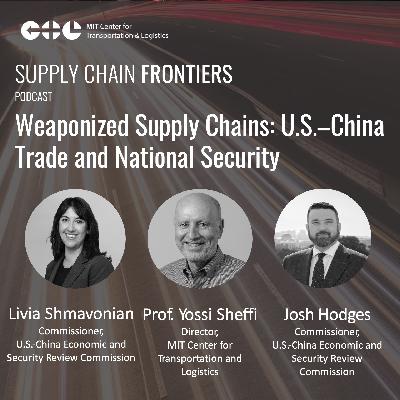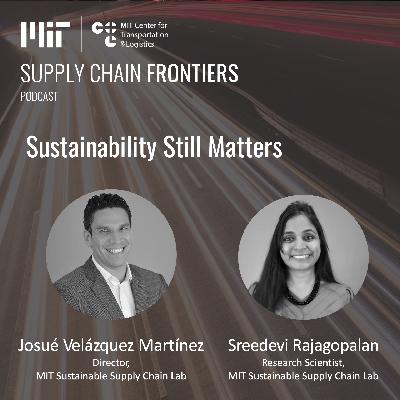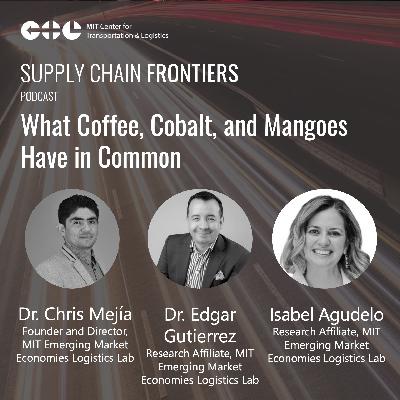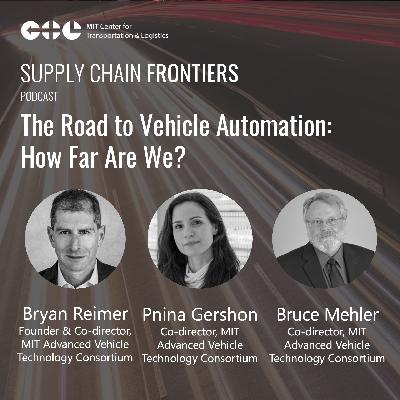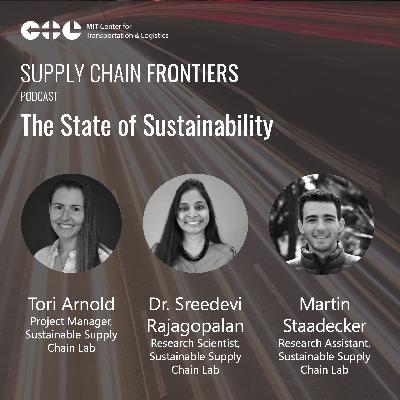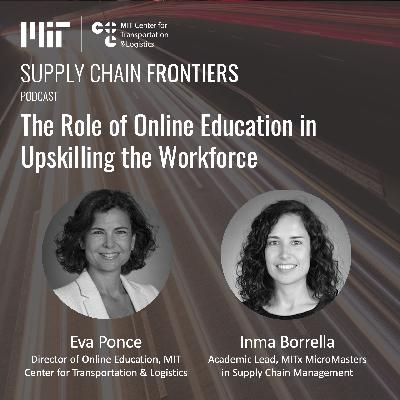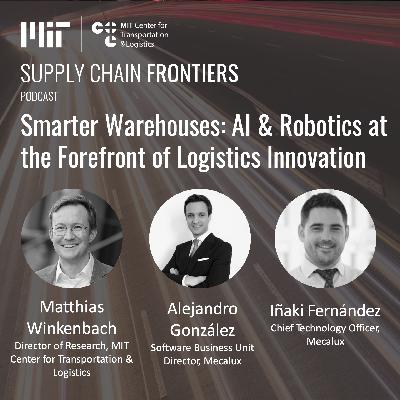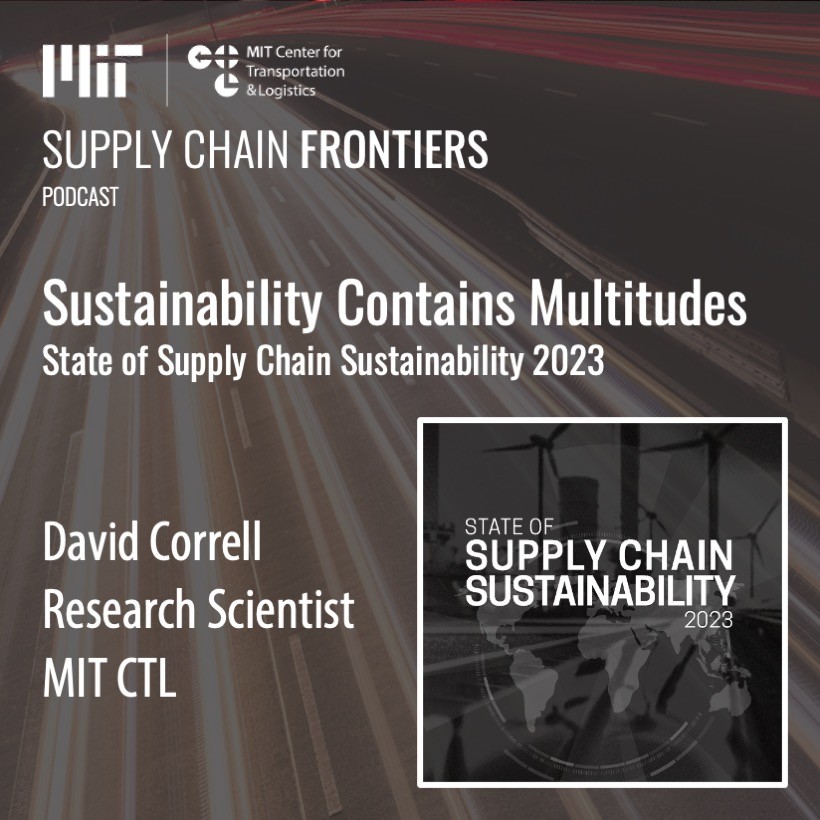Discover MIT Supply Chain Frontiers
MIT Supply Chain Frontiers

37 Episodes
Reverse
Rising geopolitical tensions and global trade volatility have revealed a key power struggle: supply chains are a matter of national security. This year’s annual report from the congressional U.S.–China Economic and Security Review Commission warns that China has begun weaponizing key supply chain chokepoints, from critical minerals to foundational semiconductors, creating risks that reach far beyond trade.
In this episode, we’re joined by Livia Shmavonian and Josh Hodges, two commissioners of the U.S.–China Economic and Security Review Commission, along with Professor Yossi Sheffi, Director of the MIT Center for Transportation and Logistics. They discuss key findings from this year’s report: why companies have been slow to recognize the strategic nature of their dependence on China, how subsidies and overcapacity distort global competition, and why innovation remains the United States’ greatest advantage. From U.S. manufacturing limitations to market access in China, the conversation explores what’s at stake, what must change, and how companies and policymakers can prepare for a future where supply chain strategy is inseparable from national security.
You can read the full report here.
As global supply chains face new waves of political uncertainty, regulatory change, and economic pressure, one thing remains clear: sustainability still matters. The latest State of Supply Chain Sustainability Report from the MIT Sustainable Supply Chain Lab reveals that despite federal environmental rollbacks and shifting investor priorities, companies continue to see sustainability as central to long-term success.
In this episode, we’re joined by Dr. Josué Velázquez Martínez, director of the lab, and Dr. Sreedevi Rajagopalan, a research scientist in the lab. They unpack key findings from this year’s survey—why 80% of firms say sustainability is vital to their future, where companies stand in tracking Scope 3 emissions, and which energy sources could redefine sustainable freight transportation. From biofuels and hydrogen to the data behind carbon accounting, the conversation explores what’s driving progress and why collaboration may be the most necessary sustainability strategy of all.
Emerging markets play an essential role in global supply chains, providing much of the food, raw materials, and labor that keep the world running. But they also face unique challenges: fragmented systems, limited infrastructure, and volatile economies. At the same time, these regions hold immense potential for innovation, resilience, and growth if their logistics systems can adapt to meet rising pressures from climate change, geopolitical shocks, and shifting consumer demands.
In this episode, we’re joined by Dr. Chris Mejía, Founder and Director of the MIT Emerging Market Economies Logistics Lab (EMeL), along with Research Affiliates Dr. Edgar Gutierrez and Isabel Agudelo. They discuss the launch of this new lab at the MIT Center for Transportation and Logistics, its mission to strengthen supply chains across the Global South, and the human decisions that ultimately shape logistics outcomes. From the fate of mangoes in Ghana to cobalt in the Congo, the conversation reveals why emerging markets matter to everyone—and how building trust may be the biggest logistics challenge of all.
Self-driving cars have been heralded by many as the future of transportation—promising safer roads, reduced traffic, and greater mobility for all. Yet despite rapid advancements in technology and a surge in assistive driving features, acceptance of full vehicle automation remains elusive. As the public grapples with questions of trust, safety, and responsibility, the road to widespread adoption of automated vehicles is anything but straightforward. The stakes are high: how we navigate this transition could redefine the way we move for generations to come. So, how far are we from acceptance, adoption, and implementation?
In this episode, we’re joined by the co-directors of the Advanced Vehicle Technology (AVT) Consortium, hosted within the MIT AgeLab at the MIT Center or Transportation & Logistics: Dr. Bryan Reimer, Dr. Pnina Gershon, and Dr. Bruce Mehler. They explore key insights from their recent research, the role of data in shaping safer and smarter mobility solutions, and how the consortium is addressing critical questions around driver behavior, automation readiness, and industry collaboration as they celebrate their 10th anniversary year.
Sustainability has become an imperative for many companies—but in the face of regulatory rollbacks and budget cuts, are those goals here to stay? In this episode, we explore how companies can meaningfully pursue sustainability, even amid shifting political and economic pressures. We discuss growing public support for sustainability, the role of data and modeling in shaping corporate sustainability strategies, and how companies can build resilient, responsible supply chains.
In this episode, we’re joined by members of the MIT Sustainable Supply Chain Lab, hosted within the MIT Center for Transportation & Logistics: Tori Arnold, Project Manager, Dr. Sreedevi Rajogopalan, Research Scientist, and Martin Staadecker, Research Assistant. The lab’s annual State of Supply Chain Sustainability Survey offers insights into the current state of sustainability across industries—we invite you to complete this year’s survey here (open until May 31st, 2025).
In recent years, online education has come to the forefront as an alternative to traditional education programs. Its increasing prominence reflects its adaptability, flexibility, affordability, and far-reaching scale. As the global workforce stands to undergo significant changes in the next 5-10 years due to digitalization, advancements in AI, and automation, employers are increasingly valuing skills over degrees. For workers, this requires a practice of continuous learning.
In this episode, we’re joined by Dr. Eva Ponce, Director of Online Education at the MIT Center for Transportation & Logistics, and Dr. Inma Borrella, Academic Lead for the MITx MicroMasters Program in Supply Chain Management. Eva and Inma discuss the role of online education in upskilling the workforce and the impact of the MITx MicroMasters Program, the first of its kind.
Host & Executive Producer: Benjy Kantor
Marketing Writer & Producer: Mackenzie Berry
Sound Editor: David Benjamin Sound
Audio Engineer: Kurt Schneider
In this episode we sit down with Dr. Matthias Winkenbach, Director of Research at the MIT Center for Transportation & Logistics, Alejandro González, Software Business Unit Director at Mecalux, and Iñaki Fernández, Chief Technology Officer at Mecalux.
Mecalux, a provider of warehouse management solutions, is a founding research partner of the new MIT Intelligent Logistics Systems Lab, which is at the forefront of advancing logistics through innovative technology. We discuss how AI and machine learning are not just buzzwords but can actually create additional value in warehouse robotics, such as in the case of autonomous robots and software solutions that help companies manage demand out of a distributed network.
Host & Executive Producer: Benjy Kantor
Marketing Writer & Producer: Mackenzie Berry
Sound Editor: David Benjamin Sound
Audio Engineer: Kurt Schneider
Vehicle routing is one of the most well-understood, extensively studied problems in both history and academia—it's been studied by academics since the early 1800s. Yet 200 years later, optimal efficiency remains just out of reach. And given the enormous increase in pressure for consumer expectations in recent years, that remaining "last mile" of vehicle routing efficiency could, on a global scale, make a huge difference to a huge number of people.
In this episode, we're joined by Matthias Winkenbach, Director of Research at the MIT Center for Transportation & Logistics. Matthias is an expert in urban logistics, last-mile delivery, and vehicle routing, and he has just launched a new lab, the MIT Intelligent Logistics Systems Lab, that will use AI and machine-learning techniques to tackle today's vehicle routing challenges—and that could make a major impact on vehicle routing solutions where traditional methods and algorithms have come up just short.
intelligent.mit.edu
Host & Executive Producer: Benjy Kantor
Marketing Writer & Producer: Dan McCool
Sound Editor: David Benjamin Sound
Audio Engineer: Kurt Schneider
In this episode, we sit down with members of the MIT Low Income Firms Transformation (LIFT) Lab: Director Josué Velázquez Martínez, Postdoctoral Researcher Sreedevi Rajagopalan, and Doctoral Student Fabio Castro.
We discuss the LIFT Lab's work empowering micro-retailers and nanostores in emerging markets to lift themselves out of poverty. These retailers, while making up an overwhelming majority of retail business in their regions, are at a significant disadvantage when dealing with large suppliers and competing with large retailers—some 30% of these firms fail within 5 years of opening.
Using generative AI, the LIFT Lab is helping these retailers enhance their business decision-making and supply chain capabilities to help them survive and thrive.
Host & Executive Producer: Benjy Kantor
Marketing Writer & Producer: Dan McCool
Sound Editor: David Benjamin Sound
Audio Engineer: Kurt Schneider
Warehouses are undergoing a fundamental transformation—in response to the explosion of growth in the e-commerce space and worldwide large-scale supply chain disruptions, warehouses have gone from places simply for goods to sit to highly interconnected, automated hubs of activity. Warehouses of the future leverage new technologies in automation and digitalization to enhance precision, flexibility, and efficiency to adapt quickly to changing market and supply chain trends and needs.
In this episode, we're joined by Miguel Rodríguez García, a Postdoctoral Associate at the MIT Center for Transportation & Logistics, and Erez Agmoni, Global Head of Innovation (Logistics & Services) at international shipping giant Maersk. Miguel and Erez take us through the changes and technologies that are transforming warehouses and the ways in which companies are seeking to make these transformations sustainable.
The warehouse of the future signifies a forward-thinking model that aligns operational efficiency with a sustainable approach to warehousing, which is pivotal to the evolution of contemporary supply chains.
For the full white paper, "The Warehouse of the Future," click here.
Host & Executive Producer: Benjy Kantor
Marketing Writer & Producer: Dan McCool
Sound Editor: David Benjamin Sound
Audio Engineer: Kurt Schneider
On this episode, we're joined by Melanie Nuce-Hilton, SVP for Innovation and Partnerships at GS1 US, a nonprofit standards organization best known for administering the Universal Product Code (UPC) barcode—and celebrating its fiftieth anniversary right around the same time as MIT CTL. Melanie talks all about the history of supply chain standards over the last 50 years, including the UPC barcode, RFID, and others. And she also discusses the exciting innovations that are on the horizon to uncover new possibilities for industry stakeholders.
Host & Executive Producer: Benjy Kantor
Marketing Writer & Producer: Dan McCool
Sound Editor: David Benjamin Sound
Audio Engineer: Kurt Schneider
MIT CTL Research Scientist David Correll joins us to share findings from the State of Supply Chain Sustainability 2023. Pressure on firms to make their supply chains more sustainable has increased over the past four years and isn't going anywhere, though the distinct areas of sustainability on which that pressure focuses are constantly changing. Indeed, sustainability is complex and contains multitudes. The report also takes a look at firms' progress on achieving their Scope 3 emissions goals.
The full State of Supply Chain Sustainability report is available free at sscs.mit.edu.
Host & Executive Producer: Benjy Kantor
Marketing Writer & Producer: Dan McCool
Sound Editor: David Benjamin Sound
Audio Engineer: Kurt Schneider
In this episode, MIT CTL Director Yossi Sheffi, an expert with nearly five decades of experience in the supply chain and logistics areas, sits down with Susan Lacefield, Executive Editor of Supply Chain Quarterly. Yossi and Susan discuss the miracle of modern global supply chains—a magic conveyor belt that moves goods from mines and forests to supermarket shelves. They also discuss supply chain resilience in the face of major disruptions, the growing role that AI will play in supply chains, and how that affects practitioners, businesses, and consumers alike.
Executive Producer: Benjy Kantor
Marketing Writer & Producer: Dan McCool
Sound Editor: David Benjamin Sound
Audio Engineer: MIT Audio/Visual Services
"Hope is not a strategy."
In this episode, we are joined by Kathy Fulton, Executive Director of the American Logistics Aid Network (ALAN), who discusses her work connecting private-sector resources with disaster response needs: a "gray sky" response, after a disaster hits. For instance, if a supplier has excess food they need to offload, ALAN will connect them with a warehouse with the capacity to accept the delivery. ALAN forges partnerships between various players in the supply chain as well as between the public and private sectors, which, along with information sharing among all parties, are critical to fostering collaboration in order to respond effectively to a disaster and to strengthen future disaster preparedness.
Hosts: Tim Russell & Lauren Finegan
Executive Producer: Benjy Kantor
Marketing Writer & Producer: Dan McCool
Sound Editor: David Benjamin Sound
Audio Engineer: Kurt Schneider
In the wake of a disaster, restoring supply chains can be critical in assuring that the most vital needs of affected communities are met.
In this episode, Tim Russell and Lauren Finegan of the MIT Humanitarian Supply Chain Lab discuss the fundamentals of humanitarian logistics and disaster response—including how to best build resilient communities, how the public and private sectors can work together for optimal disaster response, and how their research and work helps inform and strengthen disaster response work worldwide.
Learn more about the work of the MIT Humanitarian Supply Chain Lab.
Host & Executive Producer: Benjy Kantor
Marketing Writer & Producer: Dan McCool
Sound Editor: David Benjamin Sound
Audio Engineer: Kurt Schneider
Supply chain design has traditionally been conducted with only one dimension in mind: cost minimization. The conventions of supply chain design date largely from the 1990s. But major technological strides have been made in the years since, allowing for much more complex considerations to be taken into account. So most companies, by using this obsolete approach, are putting themselves at a competitive disadvantage.
Today's episode features Milena Janjevic, Research Scientist at the MIT Center for Transportation & Logistics, and Mike Bucci, a Senior Director for Solutions Delivery at Coupa Software. Milena and Mike discuss how they're seeing the field evolve, touching on four big opportunities to take supply chain design from a cost-minimization exercise to an engine to drive value creation:
Extending the scope of supply chain design
Incorporating tactical decision making
Accounting and planning for risk and resilience
Adapting new technologies and business models
For more, learn about the Supply Chain Design Initiative at the MIT Center for Transportation & Logistics.
Host: Arthur Grau
Executive Producer: Benjy Kantor
Marketing Writer & Producer: Dan McCool
Sound Editor: David Benjamin Sound
Truckload transportation services procurement is costly and time-intensive. These months-long procurement events typically result in thousands of contracts between shippers and carriers. The contracts cover each of the shipper’s product distribution lanes or origin-destination pairs.
Due to truckload supply and demand uncertainty, shippers often adopt a coverage strategy to secure contracted capacity on combinations of lanes to meet expected demand. However, this strategy leads to unnecessary costs and inefficiencies. We find that many lanes never end up being utilized. We refer to contracted lanes on which no business materializes as "ghost lanes."
On today’s episode, research scientist David Correll speaks with Tilburg University postdoctoral researcher Angela Acocella Ph.D. '22 on the hidden costs and possible reasons for ghost lanes.
Read more. https://ctl.mit.edu/pub/workingpaper/hidden-costs-not-so-friendly-ghost-lanes
This episode marks the second installment of research scientist David Correll speaking with the 2021–22 MIT CTL military fellows: US Army Col. Joe Parker, Lt. Col. Brian Young, and Louisiana National Guard Lt. Col. Stephen J. Luebbert.
Today’s conversation is all about empathetic leadership. Parker, Young, and Luebbert discuss how leading teams in high-stress environments like military combat requires empathy and humility. They revisit continual process improvement, applying the "red cell" strategy, and the after-action review process. Sharing their personal stories, they portray how effective leaders listen to those around them and enthusiastically welcome positive and negative feedback to make sound decisions, foster team cohesion, and achieve peak performance.
Since 2007, MIT CTL has hosted three US military officers each year for a course of academic study that parallels the MIT ten-month Supply Chain Management master’s program. Sponsored by the United States Army War College’s Senior Service College Fellows (SSCF) program, top officers are selected to attend.
CTL Military Fellows accompany the more than 80 other global business professionals in the program’s curriculum and develop strong analytical, change management, and leadership skills. Their work includes an in-depth research project.
In today’s episode, research scientist David Correll speaks with the 2021–22 MIT CTL military fellows: US Army Col. Joe Parker, Lt. Col. Brian Young, and Louisiana National Guard Lt. Col. Stephen J. Luebbert. The fellows discussed their experiences in the military and the MIT SCM program.
For written and downloadable transcripts visit ctl.mit.edu
Their conversation explores the differences and similarities between private-sector and military supply chains in strategy, leadership, and on-the-ground implementation. We learn how in the private sector, cost and efficiency drive supply chain decision making, whereas in the military portability, safety, and redundancy may be seen as primary drivers. The episode ends with some ideas about how the government and private sector could collaborate more.
Since 2007, MIT has hosted three US military officers each year for a course of academic study that parallels the MIT ten-month Supply Chain Management master's program. Sponsored by the United States Army War College’s Senior Service College Fellows (SSCF) program, top officers are selected to attend.
CTL Military Fellows accompany the more than 80 other global business professionals in the program’s curriculum and develop strong analytical, change management, and leadership skills. Their work includes an in-depth research project.
Join MIT Global SCALE Connect for an in-depth conversation with Paul Granadillo, SVP Global Supply Chain at Moderna. MIT Professor Yossi Sheffi speaks with Paul about how the pandemic vaccine response reshaped manufacturing, business, and supply chains at Moderna.
Mr. Granadillo shares his professional experiences learned from joining the company during a time of growth. He describes some of the methods Moderna uses to meet its logistics and production requirements during the ramp-up to a global Covid-19 vaccine rollout.
Recorded at MIT SCALE Connect, the winter education convening of the MIT Global SCALE Network.


